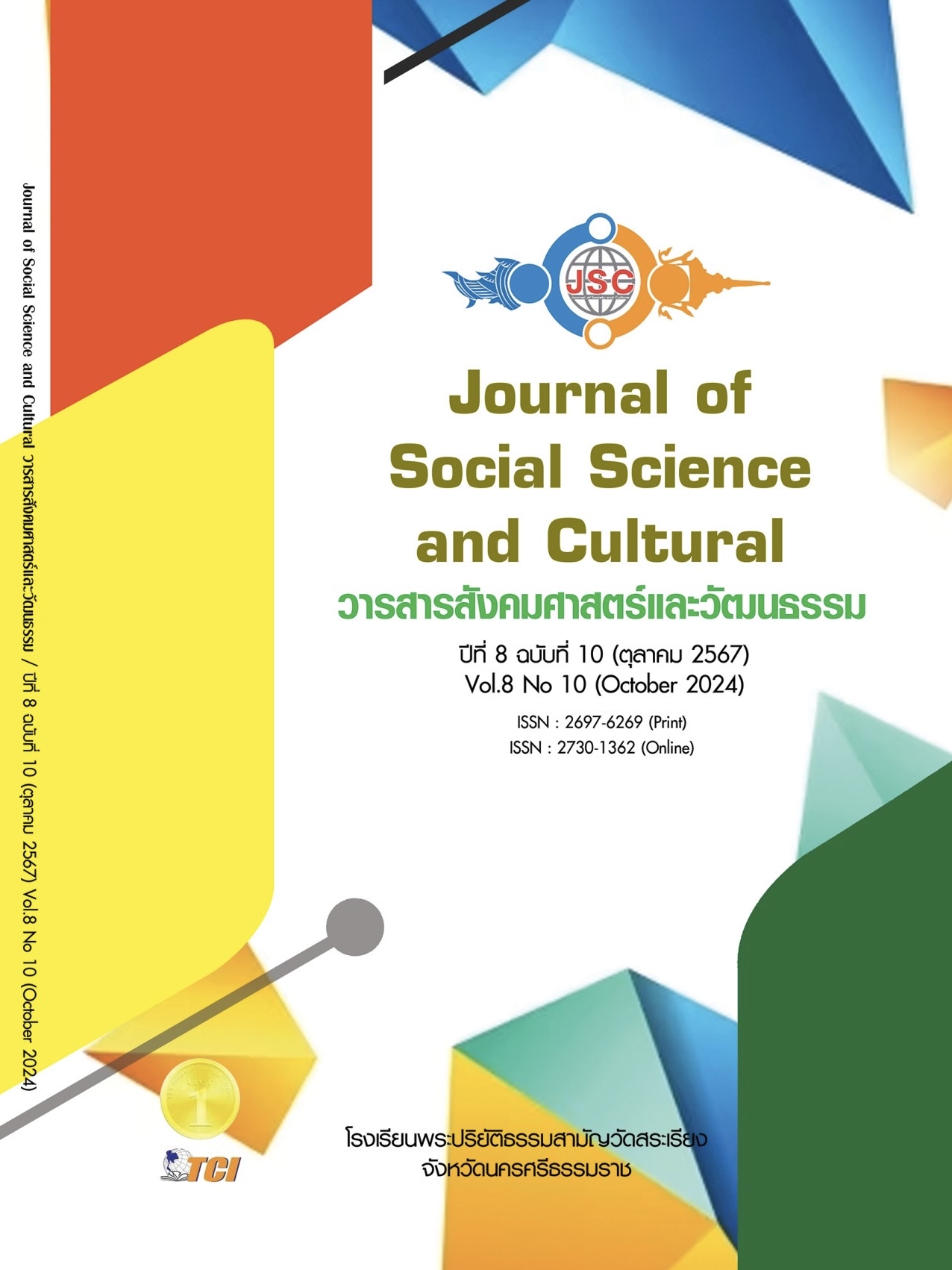THE DEVELOPING OF FACTORS AND STUDYING AN INNOVATIVE LEADERSHIP LEVEL WITH MANAGEMENT OF THE EDUCATIONAL INNOVATION ECOSYSTEM OF SCHOOL ADMINISTRATORS UNDER THE BANGKOK METROPOLITAN ADMINISTRATION
Main Article Content
Abstract
This research aims to 1) Develop the components of innovative leadership and the management of the educational innovation ecosystem among school administrators under the Bangkok Metropolitan Administration, and 2) Examine the level of innovative leadership and the management of the educational innovation ecosystem among school administrators under the Bangkok Metropolitan Administration. A mixed-methods research design was employed. The sample consisted of two groups: Group 1 comprised 7 experts in leadership and educational innovation, who are school administrators with demonstrated achievements and experience in educational innovation at the supervisory level or higher; Group 2 consisted of 441 school administrators, also at the supervisory level or higher, from schools under the jurisdiction of Bangkok Metropolitan Administration. The research instruments included a semi-structured interview with 6 questions aimed at developing the components of innovative leadership and the management of the educational innovation ecosystem among school administrators, and a rating scale questionnaire measuring innovative leadership and the management of the educational innovation ecosystem among school administrators, consisting of 8 components, with 5 items per component, totaling 40 items. Qualitative data were analyzed using content analysis, while quantitative data were analyzed using means, standard deviations, and assessments of the level of innovative leadership. The findings revealed that 1) innovative leadership among school administrators consists of 8 components: 1.1) Participation in innovation-related work, 1.2) Serving as a modern role model in innovation, 1.3) Maintaining networks and ethical standards, 1.4) Fostering innovation development within the organization, 1.5) Demonstrating visionary leadership in innovation, 1.6) Creating an atmosphere that promotes an innovation-driven organization, 1.7) Engaging in creative thinking about innovation, and 1.8) Embracing risks associated with innovation; and 2) The level of innovative leadership and management of the educational innovation ecosystem among school administrators was high across all components.
Article Details
References
กระทรวงศึกษาธิการ. (2562). พระราชบัญญัติพื้นที่นวัตกรรมการศึกษา พ.ศ. 2562. เรียกใช้เมื่อ 13 มิถุนายน 2567 จาก https://www.moe.go.th.
จิติมา วรรณศรี. (2563). นวัตกรรมสู่การพัฒนาสถานศึกษา. พิษณุโลก: รัตนสุวรรณการพิมพ์.
วิโรจน์ สารรัตนะ. (2556). กระบวนทัศน์ใหม่ทางการศึกษา. กรุงเทพมหานคร: ทิพยวิสุทธิ์.
สมนึก เอื้อจิระพงษ์พันธ์. (2553). รูปแบบการพัฒนาความสามารถในการจัดการความรู้ของผู้ประกอบการที่มีนวัตกรรมในประเทศไทย. กรุงเทพมหานคร: สำนักพิมพ์แห่งจุฬาลงกรณ์มหาวิทยาลัย.
สำนักงานการต่างประเทศ. (2567). เป้าหมายการพัฒนาที่ยั่งยืน-SUSTAINABLE DEVELOPMENT GOALS (SDGS). เรียกใช้เมื่อ 13 มิถุนายน 2567 จาก https://www.sdgmove.com/intro-to-sdgs/
สำนักงานคณะกรรมการการศึกษาแห่งชาติ. (2559). แนวโน้มภาพอนาคตการศึกษาและการเรียนรู้ของไทย. กรุงเทพมหานคร: เซนจูรี่.
สำนักงานคณะกรรมการพัฒนาการเศรษฐกิจและสังคมแห่งชาติ. (2563). แผนปฏิรูปประเทศ. (พิมพ์ครั้งที่ 3). กรุงเทพมหานคร: สำนักงานเลขานุการของคณะกรรมการยุทธศาสตร์ชาติ สำนักงานคณะกรรมการพัฒนาการเศรษฐกิจและสังคมแห่งชาติ.
สำนักงานเลขาธิการสภาการศึกษา. (2561). มาตรฐานการศึกษาของชาติ 2561. กรุงเทพมหานคร: สำนักงานเลขาธิการสภาการศึกษา.
สำนักงานเลขาธิการสภาการศึกษา. (2562). สภาวะการศึกษาไทย 2561/2562 การปฏิรูปการศึกษาในยุคดิจิทัล. กรุงเทพมหานคร: สำนักงานเลขาธิการสภาการศึกษา.
Adner, R. (2006). Match your innovation strategy to your innovation ecosystem. Harvard Business Review, 84(4), 98-107.
Autio, E. & Thomas, L. D. W. (2014). Innovation ecosystems: Implications for innovation management. Oxford: Oxford University Press.
Castro, M. P. et al. (2019). The impact of higher education on entrepreneurship and the innovation ecosystem: A case study in Mexico. Journal of Management and Innovation, 11(20), 55-97.
Gomes, L. A. et al. (2018). Unpacking the innovation ecosystem construct: Evolution, gaps and trends. Journal of Management, 136(4), 30-48.
Granstrand, O. & Holgersson, M. (2020). Innovation ecosystems: A conceptual review and a new definition. Retrieved June 13, 2024, from https://www.sciencedirect.com/science/article/pii/S0166497218303870?via%3Dihub
Office of the Education Council. (2016). næonom phap anakhot kansưksa læ kanrianru kho̜ng Thai Trends in the future of education and learning in Thailand. Bangkok: senchuri.
Wareham, J. et al. (2014). Technology ecosystem governance. Organization Science, 25(4), 1195-1215.
Weberg, D. (2013). Innovation leadership behaviors: Starting the complexity journey. Burlington, New Jersey: Jones & Bartlett Learning.
World Economic Forum. (2018). The Future of Jobs Report 2018. Open Journal of Business and Management, 9(5), 187-199.


